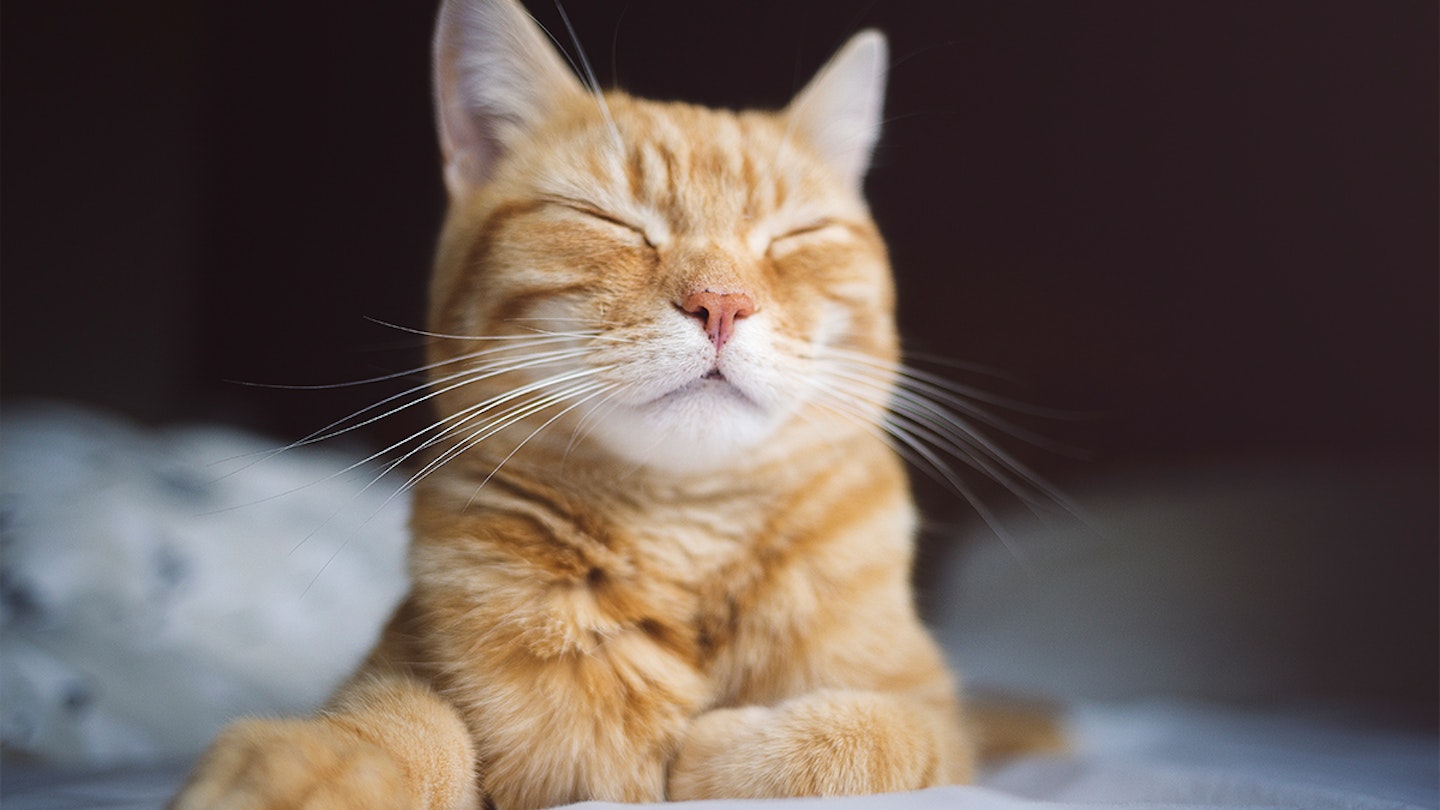Cats are usually very clean and orderly and keep all toileting to the litter tray or garden. So, it may raise some concerns if your cat starts spraying in the house.
Spraying is when a cat backs up to a vertical surface with its tail up and squirts urine. You will see their tail quiver while they spray. Urine marking is not a litter box issue but is related to cat anxiety or they may feel threatened.
Here is how to stop a cat from spraying, how to determine the root of the cause and other health signs you should look out for.
Why do cats spray?
Spraying is a way for cats to mark their territory. Cats mainly do this outdoors, where there is more rivalry with other cats. Outside, cats usually spray urine which leaves their scent instead of rubbing their faces on a certain place to mark themselves.
It is completely natural for cats to spray outside, however, if they start to do this in your home it could mean that they are anxiousor have other underlying health concerns.
Spraying is another type of marking behaviour that is mainly used outdoors, where there’s more competition with other cats. Instead of rubbing their faces to mark their territory, cats spray urine, which carries their own individual scent.
All cats whether male or female, entire or neutered, spray as part of their scent communication system. Felines leave a scent to alert other cats of their territory, but also to give the area a familiar smell to boost their confidence and security. In un-neutered cats, the urine signals both a cat’s presence and sexual status.
Females in season have high levels of oestrogen in their urine in order to attract a cat to mate with. Male cats will release a highly pungent spray.
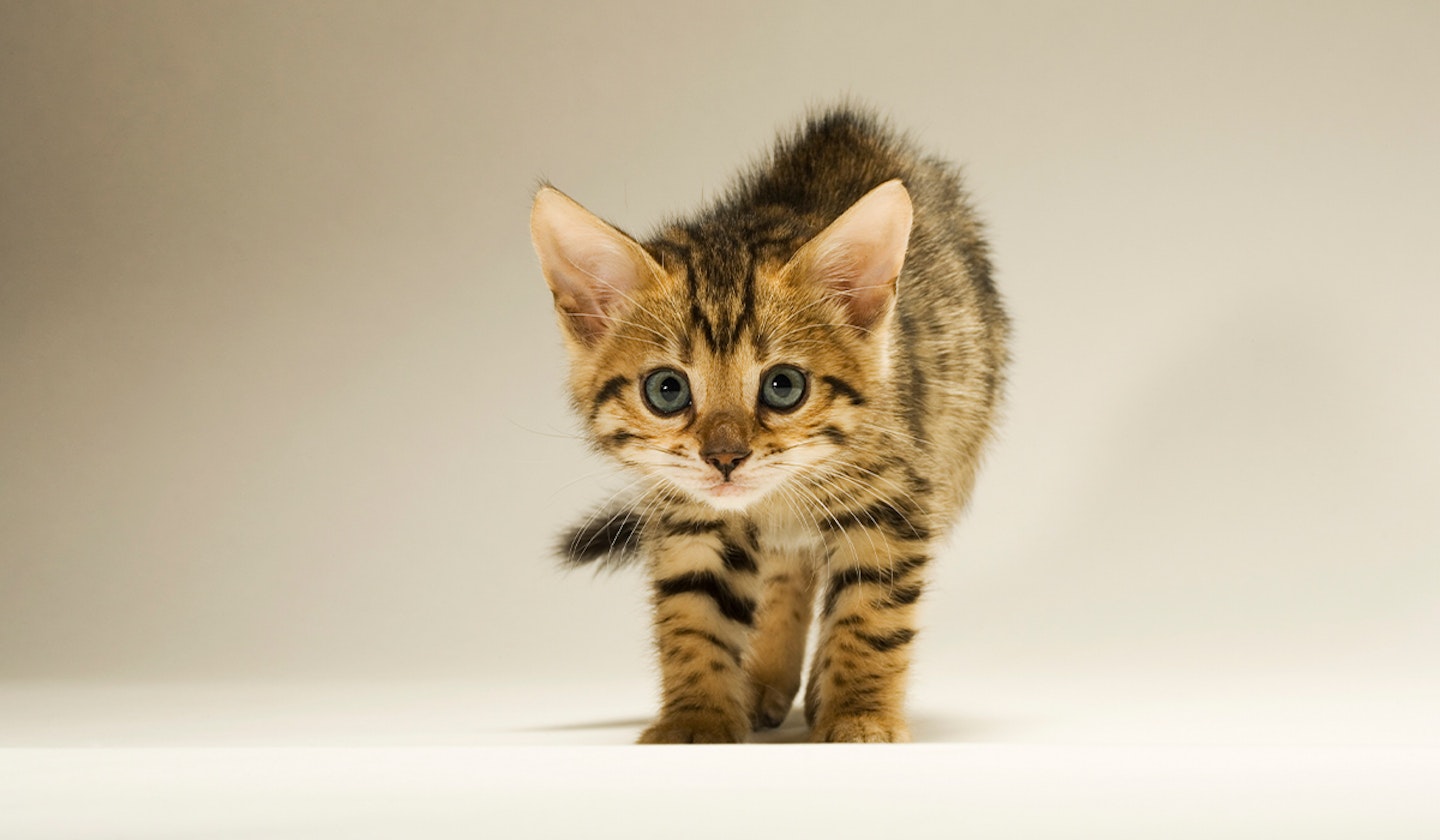
What's the difference between urinating and spraying?
To wee, your cat will simply squat down and empty their bladder, typically on a horizontal surface. But if they spray, their tail will be upright and you'll notice them making a treading motion with their back legs. They will then 'spray' a small amount of wee onto a vertical surface like a wall.
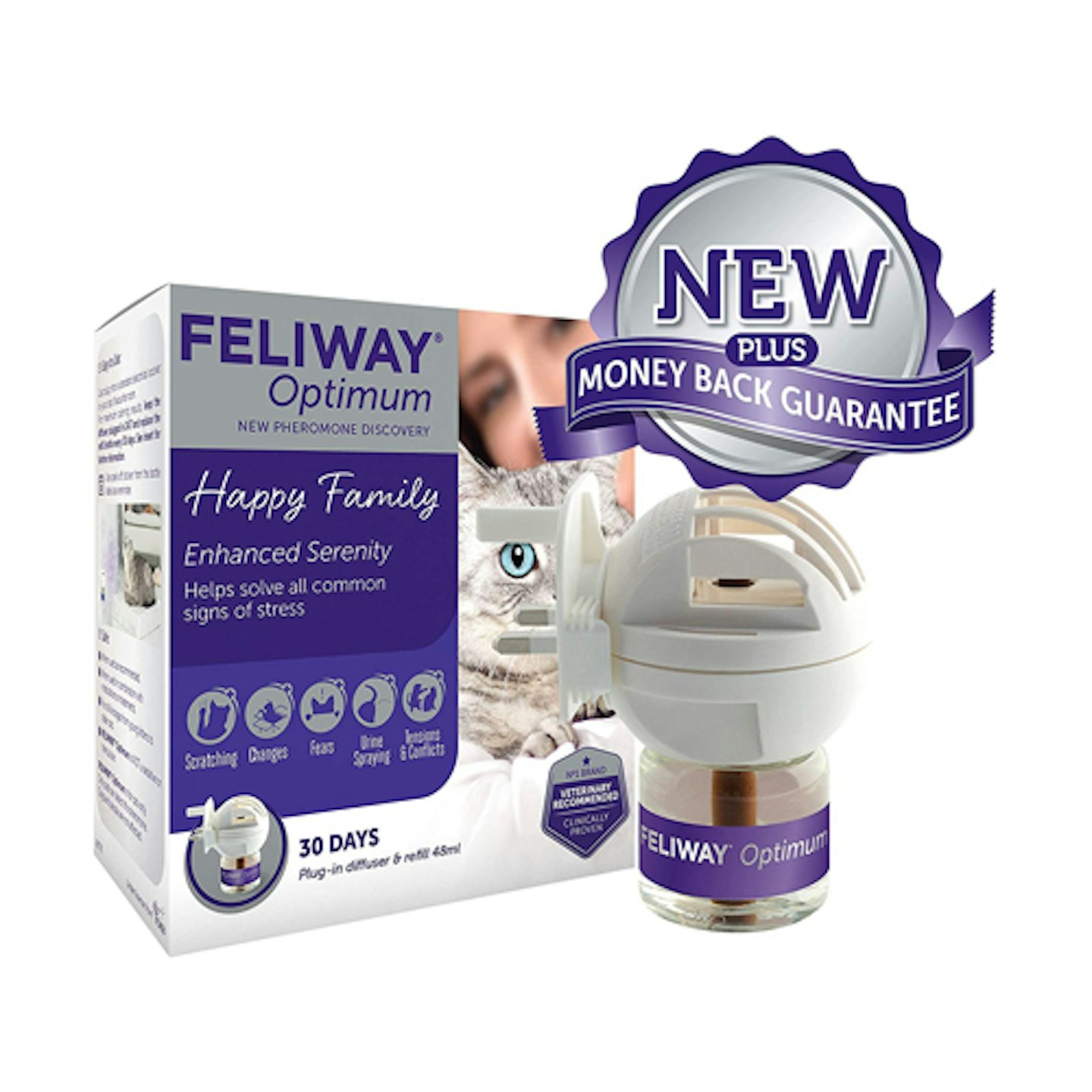
The Feliway Optimum Diffuser Starter Kit and Refill, 48ml contains a brand new pheromone complex which has been proven to calm cats better than ever. Scientifically proven, this diffuser is scentless for us.
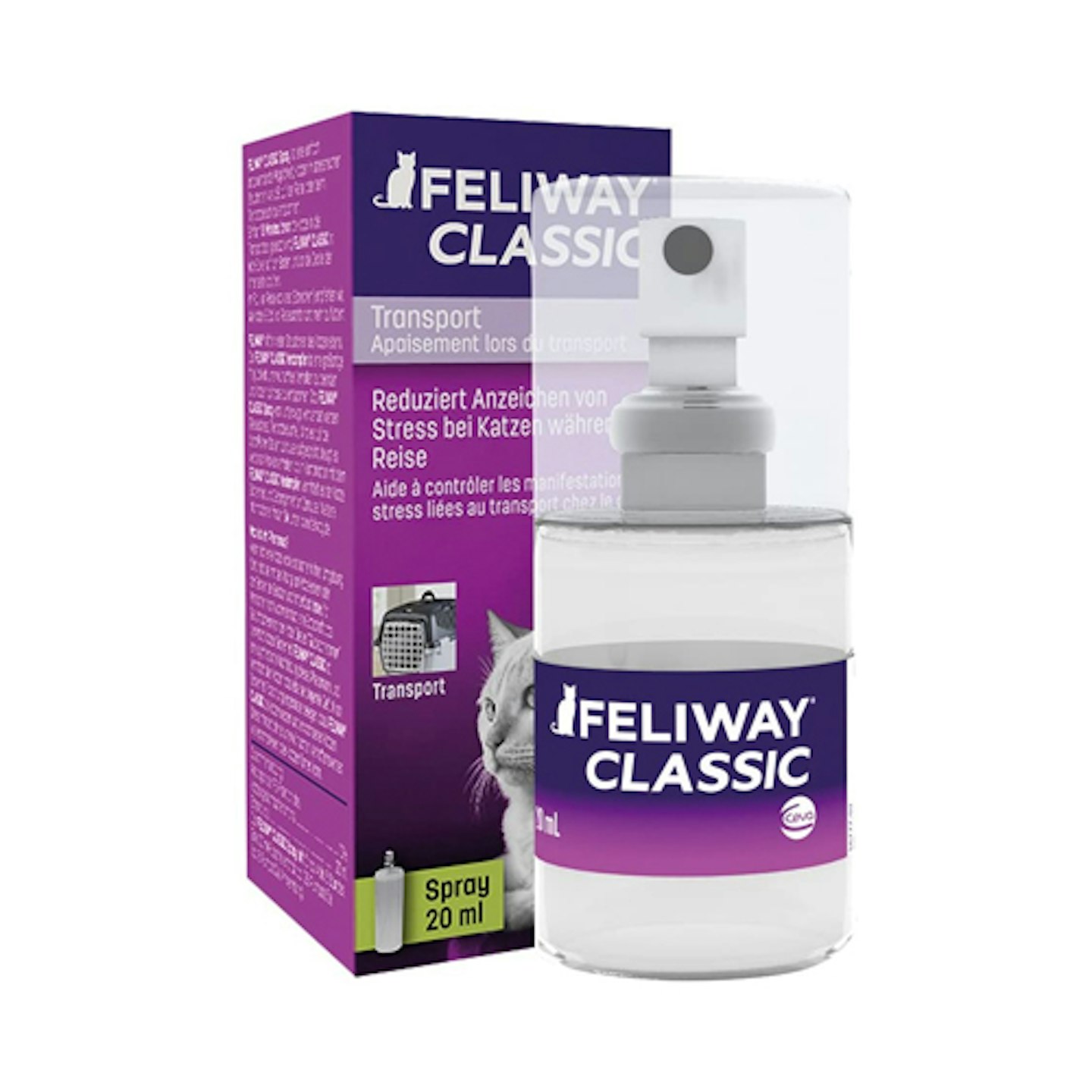 Amazon
AmazonThe FELIWAY Classic 20ml Spray contains the 'feline facial' pheromone - A natural pheromone a cat releases when they rub up against something to mark an area as safe and secure. It's scentless for us, too.
What to do if your cat is spraying indoors
The first thing to do is establish what has caused your cat to feel stressed. It may be that there is a new cat in your home or neighbourhood or an environmental change. If you have a cat flap and other neighbourhood cats are entering your home, then try to shoo them away to discourage them from coming into your cat’s personal space. You could also fit a secure cat flap that is magnetic, or microchip activated which will stop other cats from coming into your house.
Another factor to consider is if you have recently got a new pet, or perhaps lost one. Some cats do not cope well with changes. The best way to reassure your cat that they are secure is by making sure that everything is as routine and in place. Such as giving them food and water at the same time, cleaning their litter tray and their bed and toys are still available and at the same pace and won’t be taken over by your new arrival or taken away after the passing of your other pet.
Environmental changes are also a way to trigger stress in your pet. Whether you have got new furniture, rearranged or moved to a new house these things can unsettle your cat and increase their chances of spraying. It is best to slowly introduce them to the environment and give them some time to readjust.
If you have new furniture, then an option is to gently rub a soft cloth on your cat’s face to pick up their natural pheromones then wipe the new furniture or unfamiliar areas with the cloth at your cat’s height. This means that their scent is already in the room and will help them feel more secure in the space.
Ask your vet about synthetic feline pheromones which can be used similarly, and which can be useful when dealing with stress-related problems.
How to stop cats spraying indoors
Spraying indoors signifies that your cat is already feeling anxious or threatened so you do not want to scare them by disciplining them as that will make matters worse. If you desire to stop your cat from scratching furniture, we've written a guide on that, also...
Help them feel secure
Sometimes it can actually help to limit the rooms your cat can patrol, helping them feel secure.
You should also consider how your cat might mark their territory if they're looked after by someone new or if strangers are in the house. As cats like to mark areas which have a strong scent of their owners, keep your bedroom door closed.
Clean all cat marks
Cats will often spray the same area time and over and over again, so if you spot a pattern then clean the area. Start by cleaning it with warm water and soap (enzymatic wash) or alcohol. Then let the area dry. Do not use any bleach when cleaning, ammonia or bleach cleaners will attract your cat to spray again. Then you will have taken away the marked area and it will be smell-free.
Use synthetic feline pheromones
You can ask your vet about a synthetic pheromone that can be useful if you are dealing with a stressed cat. You can also consider using FELIWAY Optimum which is clinically proven to help reduce spraying. You should see improvements within the first week and use it for at least one month. If the spraying persists, speak to a specialist.
Stick to the same litter box guidelines
To reduce stress, make sure to stick to one litter box per cat which is easy to access, away from food and water and scooped daily and cleaned weekly.
Monitor your cat's health
Sometimes, it is a health condition that can cause cats to spray indoors, check with your vet if signs continue after trying the other methods.
Here is an infographic showing cat behaviours and how to read their body language.
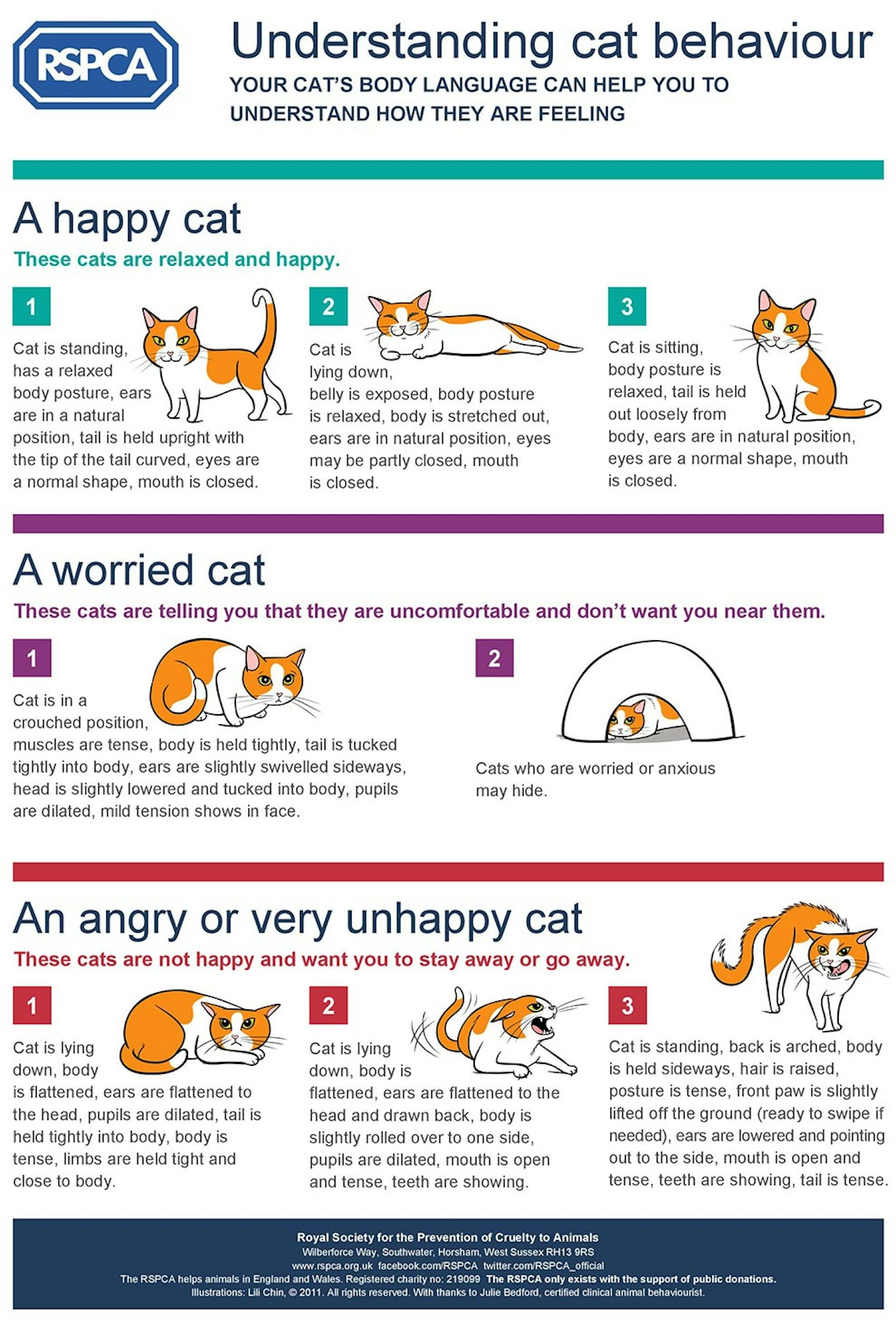
FAQs
Why do cats spray indoors?
There are a few potential reasons that your cat is toileting indoors.
Common causes of spraying include:
New cats or pets in the home
Neighbourhood cats coming indoors or outside the window
A new baby or person
Building works and disruption
Redecoration
New home
Change of routine
If you notice your pet spraying on door frames, curtains and window ledges it may mean that they feel worried or threatened by something that they have seen outside, such as a stray cat.
If your cat sprays on chair legs, beds and dressing tables, it could be a sign that they feel insecure, so they surround themselves with their own scent to increase their confidence.
If you cannot pinpoint why your cat has started to spray indoors, then reach out to your vet to identify possible reasons why so they can check for any potential health conditions.
You may also consider contacting a cat behaviourist who can help you find out what has caused your cat’s behaviour to change.
What are the medical reasons for cat spraying?
If the urine spraying comes down to a medical problem, then take your pet to the vet to have them checked over. It could be Feline Lower Urinary Tract Disease (FLUTD) which is a common, curable condition but can be potentially life-threatening if not treated.
FLUTD usually causes blockage of the urinary tract, which makes urination difficult or next to impossible. The causes and treatments for FLUTD are very different from spraying, so it is best to speak to a vet if you think their spraying may be caused by a medical reason and not an emotional one.
